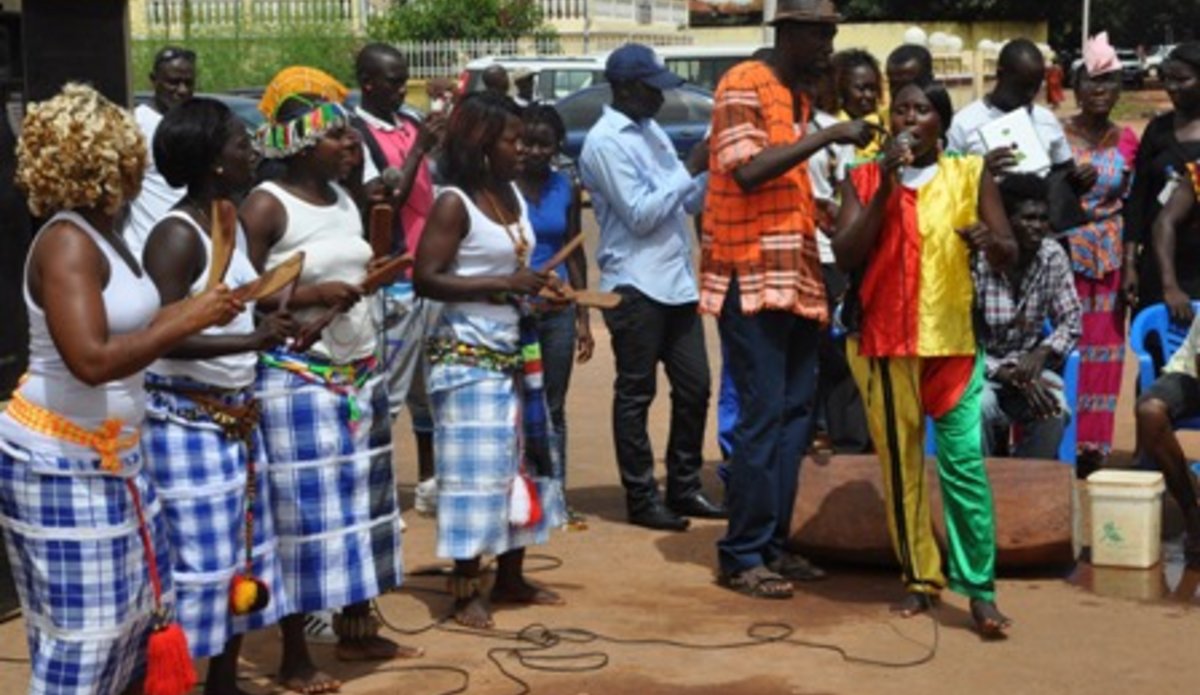Peace activities link UN, State, Civil Society and Communities in Guinea-Bissau
26 September 2013 - Youths, the elderly, women, children, state officials, the UN and civil-society groups joined hands in late September to promote peace and highlight the need for this West African country to enjoy the lasting peace its people deserve.
This was the focus of four days of activities organised in as many towns by the UN Integrated Peace-Building Support Office in Guinea-Bissau, UNIOGBIS, in collaboration with the Ministry of Culture, Youth and Sport and other partners on the occasion of the International Day of Peace and the Independence Day of Guinea-Bissau.
The activities started on the International Day, 21 September and ended on 24 September in the northern town of São Domingos.
In São Domingos, hundreds of people took part in a Sport-for-Peace Day organised by the UNIOGBIS Field Office, the local administration and a community organisation, Velhas Guardas de São Domingos. Activities included a five-kilometre peace march, sports competitions for men and women, performances by traditional dance groups and, in the evening, a community get-together.
On 22 and 23 September, football competitions organised by the mission's field offices in the eastern town of Bafata and the central town of Mansoa, respectively, brought together the UN, administrative officials and communities.
Using song, dance and drama to promote peace
Song, dance, drama and sport were used to convey messages of peace throughout the four days of activities, which were launched in Bissau on Saturday 21 September, with a cultural event presided over by the Special Representative of the UN Secretary-General for Guinea-Bissau, José Ramos-Horta. The launch was attended by the Minister of Territorial Administration, the Secretaries of State of various ministries, and representatives of sports and cultural groups and associations.
This month's peace activities are among initiatives that UNIOGBIS through its Rule of Law , Security Institutions Service, known as RoLSI, along with other UN partners has been promoting in support of the aspirations of the population, in particular their legitimate yearning for peace and security," explained RoLSI Director Antero Lopes.
These initiatives, from street theatre to radio debates on current themes have as an underlying principle collaboration between all national and international partners to attain the objectives set by the UN Security Council and by the authorities of Guinea-Bissau at all levels, he said in an interview on 25 September on the UN radio's weekly radio programme in Bissau.
In all locations, he said, there was a common language, much feeling, a great deal of authenticity on the part of the various social groups, the so-called "elderly", the wise men and wise women, youths and women. "It's clear that peace is born within each and every one of us, starting in the home, in the villages and towns, as the Special Representative said," he added.
Peace activities will be pursued - Ramos-Horta
The Special Representative of the UN Secretary-General for Guinea-Bissau, José Ramos-Horta, had stressed the importance of the commitment and involvement of everyone, at all levels, in the search for peace in Guinea-Bissau when he presided over the launch of the peace activities on 21 September.
Ramos-Horta said on Wednesday that such activities would be pursued "so that the culture of non-violence, the culture of peace, can take root in Guinea-Bissau".
He also highlighted the role the armed forces would need to play in any effort to restore peace in the country, calling on them to make an effort to maintain a frequent dialogue with civil society, with politicians, so that there is no mistrust, no rumours "and so that the people can live more in peace and tranquility.
Sport and culture, he said, are a means to an end where the culture of peace is concerned. "It's important for us to know how to occupy minds, keep the young people occupied, through sport, through cultural expressions, [...] but always in partnership with the Government and civil society," he said.
 UN
UN




